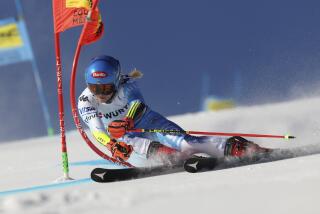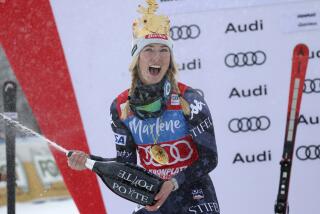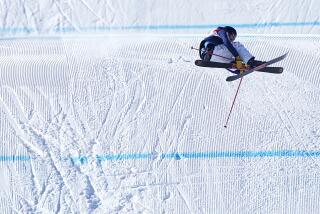THE OLYMPICS WINTER GAMES AT ALBERTVILLE : Giant Slalom Won by Tomba Again : Skiing: Italian becomes the first to score back-to-back victories in the same Alpine event at the Winter Games.
- Share via
VAL D'ISERE, France — He came, he skied and, of course, he conquered . . . again.
Alberto Tomba won the Olympic gold medal in the men’s giant slalom for an unprecedented second consecutive time Tuesday, and it ain’t over yet, folks.
Saturday at Les Menuires, the 25-year-old Italian will try for a double-double, his second consecutive gold medal in the slalom, and nobody who saw him perform on this cold but sunny day will be betting against him.
Tomba was primo-primo , No. 1 in the first run and again in the second, as he won by .32 seconds over silver medalist Marc Girardelli of Luxembourg.
Then, in typical fashion, the man who is to ski racing what Pavarotti is to opera, made a rousing curtain call, taking off his skis and walking across the finish area while trying to balance them upright on his fingertips, straight to his screaming countrymen--who were waving red, white and green Italian flags.
They and everyone else in this distant corner of the French Alps came to see La Bomba from Bologna. Rarely has one athlete been the focus of so much attention on one day, his name on everyone’s lips, and Tomba loved every minute of it.
The other racers were merely spear carriers in a libretto written solely for the leading tenor. The plot was a simple one:
Act I, Scene I. In the luck of the draw, Tomba starts the first run No. 6 and completes a near-perfect trip down the course in 1:04.57, but he winds up only .13 faster than Girardelli, who is No. 14 in the order. In fact, only .31 separates four racers--Tomba, Girardelli, super-G gold medalist Kjetil Andre Aamodt of Norway, who is .24 back, and Switzerland’s Paul Accola.
Act I, Scene II. Between runs, Tomba reloads on chocolate--”both the candy and the drinks,” he says later--relaxes and tunes up his skis for the second run, in which the top 15 will start inversely, meaning the leader is the last of the contenders to race.
Act II, Scene I. As the field gets down to the final four, Accola takes a brief lead, only to fall .20 behind Aamodt, who in turn drops .52 back when Girardelli, the four-time World Cup overall champion and super-G silver medalist, pours it on and takes over the lead. Girardelli, 28, can see his first Olympic gold medal within reach, but only if Tomba hits a sour note.
Act II, Scene II. For a few moments, that appears to be the case. At the first intermediate checkpoint, Tomba’s time is .35 slower than Girardelli’s; at the second, the Italian is still .19 behind.
Act III, Finale. With the entire mountain in an uproar, drums banging, bells clanging, horns blowing, flags waving and absolutely everyone shrieking, Tomba streaks across the finish line as the scoreboard flashes the number 1 and a total time of 2:06.98. With an upward thrust of his ski poles, he acknowledges the roar of the crowd and his status as the first Alpine skier to repeat as Olympic champion in the same event.
All in all, it was a productive day for Italy on the slopes. At Meribel, Deborah Compagnoni came out of the second seeding to win the gold medal in the delayed women’s super-G. France’s Carole Merle won the silver and Germany’s Katja Seizinger won the bronze.
Today, Vreni Schneider of Switzerland will try to duplicate Tomba’s feat as she seeks her second consecutive Olympic gold medal in the women’s giant slalom at Meribel. Marielle Goitschel of France struck gold in successive Winter Games but not in the same event, winning the giant slalom in 1964 at Innsbruck, Austria, and the slalom in 1968 at Grenoble, France.
For Girardelli, silver is becoming a habit. He also plans to challenge Tomba in the slalom, even though he suffered another injury to his left knee when he brushed hard against a gate midway through his second run Tuesday. He skipped the postrace news conference and the evening medal ceremony so he could receive treatment.
Tomba, sporting a three-day growth of whiskers, went through his obligatory paces with the media, but seemed less effervescent than usual.
Asked to compare this race with his two victories at Calgary in 1988, Tomba said: “There was one major difference. It was much easier then because that was my first Olympics. Now, there is more pressure on me as the defending Olympic champion, and because I failed to win any medals in the 1989 and 1991 World Championships.
“Also, this race was very difficult, more technical than the giant slalom at Calgary, so I am very tired.”
After his Calgary triumph, Tomba let himself get out of shape, and his skiing deteriorated. This led to the formation of Team Tomba, consisting of a private coach, retired four-time World Cup champion Gustavo Thoeni, a physical trainer and a nutritionist.
Tomba said that although he still eats plenty of pasta, he has managed to lose several pounds since his fat period three years ago, explaining: “That’s because I am drinking less now.”
Thoeni, meanwhile, has guided Tomba back to his winning ways. Tomba almost won the World Cup overall title in 1990-91, falling 20 points short of Girardelli, and has already won seven races--five slaloms and two giant slaloms--on the World Cup circuit this season.
Tomba credited Thoeni with giving him some key advice.
“We met outside the hotel at about 8:15 a.m. (Tuesday) and I took two runs,” Tomba said. “Gustavo told me, ‘You look good, but you should let your skis run in the final gates and attack more.’ And this is what I did in the second run.”
The night before, Tomba also got a little help from a friend--a kind of unofficial sports psychologist who joined the entourage last fall at Breckenridge, Colo.
“He tells me not to be too concerned before a race and this has helped me throughout the World Cup this season,” Tomba said. “We spoke about the Olympic giant slalom (Monday) night, and he told me just to treat it like any other race.”
Tomba heard about Compagnoni’s super-G victory between runs and said: “It also helped to motivate me, because I wanted this to be a great day for Italy.”
He said he planned to celebrate the dual occasion in quiet fashion Tuesday night, adding: “We don’t have time for parties now, because we have to go to Les Menuires and start training for the slalom. Oh, I might have a drink or two, but it won’t be a big party. Also, it’s a pity that the (Italian) girls are over in Meribel and not the same place as the men’s team.”
Tomba said he might also find time to shave between now and Saturday, but that it wasn’t high on his list of priorities.
And how does he feel about his chances in the slalom? “I have three gold medals now,” he said. “This will be strong motivation to make it four, to be the first to win two events twice in a row, and also to do it again in 1994.”
Is Tomba the greatest slalom-giant slalom skier of all time? “No, there is Ingemar Stenmark to think of,” he said. “He won only two gold medals (at Lake Placid, N.Y., in 1980), but he has many more World Cup victories. Give me two more years, and we’ll see.”
With his racing career mapped out through the next Winter Olympics at Lillehammer, Norway, in two years, Tomba said he is putting any movie plans on hold.
“I would like to go to Hollywood some time and make films,” he said. “And I have already talked to Sylvester Stallone about this.”
All of which raises the question: What type of roles would people pay to see Alberto Tomba play?
“Well,” he said, “I think I would be good in adventure pictures, playing action roles, something like Rambo.”
He paused, then added: “Or maybe, I would be good as a comic.”


